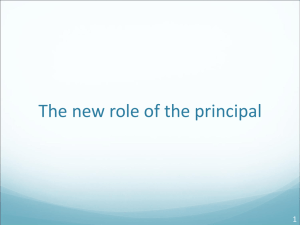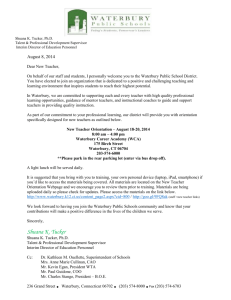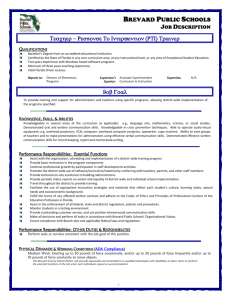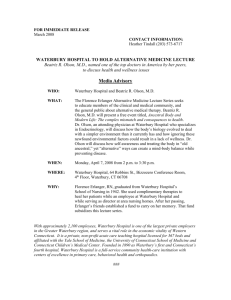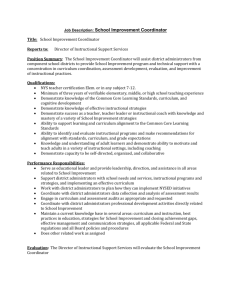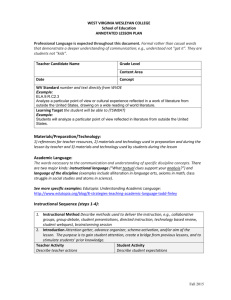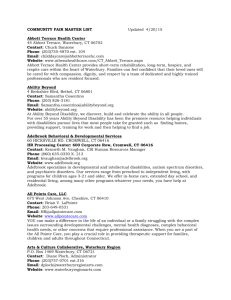Blueprint for Change - Waterbury Public Schools
advertisement
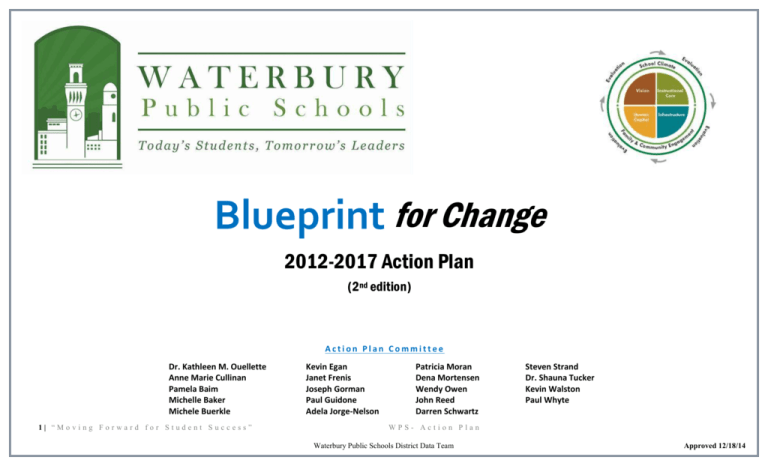
Blueprint for Change 2012-2017 Action Plan (2nd edition) Action Plan Committee Dr. Kathleen M. Ouellette Anne Marie Cullinan Pamela Baim Michelle Baker Michele Buerkle 1| “Moving Forward for Student Success” Kevin Egan Janet Frenis Joseph Gorman Paul Guidone Adela Jorge-Nelson Patricia Moran Dena Mortensen Wendy Owen John Reed Darren Schwartz Steven Strand Dr. Shauna Tucker Kevin Walston Paul Whyte WPS- Action Plan Waterbury Public Schools District Data Team Approved 12/18/14 Six Transformational Domains Waterbury Public School’s Theory of Action The primary goal for our educational leaders is to develop and sustain the essential skills and effective strategies necessary to assist all Waterbury students in achieving at high levels. Waterbury has identified Central Office Transformation as the innovation that will elevate the district from its current state, to a district marked by excellence in teaching and high achievement by all groups of learners. At the heart of the work of Central Office Transformation is serving students’ learning. Leaders acting to steward the work of central office transformation consistently convey that the work is successful only to the extent that it matters for improving learning for children and young people. All principals, in partnership with their district instructional leadership directors, receive leadership coaching from accomplished instructional leaders to increase their individual skill in guiding and supporting effective teaching for all students. In the first year of the reform effort, we redesigned our central support to emphasize a school-based model using a school reform team structure with job-embedded support; we also began working cross-functionally as an organization. Everyone must now own the work, not only at the leadership level and principal’s level, but at every level of the organization. We must all learn new ways to work differently, and sustain the reforms over time. This foundational rationale—that improvement in teaching and learning across the entire system was incumbent on the central office playing a critical support role—was in contrast to the way business had been historically conducted in Waterbury, and required major changes in how people in the central office thought about their work. This foundational rationale, however, is consistent with the theory of action that redefined the central office as a service organization that exists to support reform in the schools. We believe central office transformation moves beyond the existing culture in the school system about whether schools or the central office should be driving reform and shows that improving teaching and learning district-wide is a systems problem—a challenge that requires the participation of both central office and schools in leadership roles to realize reform outcomes. Creating entire systems of excellent schools requires the exercise of leadership throughout district systems. Our close examination of central office practice clearly suggests that work at both levels is absolutely essential to the creation of a system of schools that can serve our students. The central office transformation effort was crucial in the development of a theory of action that necessarily changed over time as the central office work unfolded. If Instructional Leadership Directors work with principals individually and in learning networks to strengthen principals’ instructional leadership, then all principals will strengthen their instructional leadership skills, encourage and promote high quality teaching in every classroom and significant improvements in teaching and learning district-wide will result. If all principals become excellent instructional leaders with the capacity to encourage and promote high quality teaching in every classroom, then high quality teaching in every classroom will result and thus, all students will be achieving at high levels. If Central Office leaders focus their attention directly on supporting improved principal instructional leadership and classroom practice, then powerful/highly effective instruction for all students will result. If Central Office creates “learning-focused partnerships” with principals through which all principals receive ongoing, personalized, differentiated supports for their development as instructional leaders from dedicated, executive-level central office staff, then all principals will strengthen their instructional leadership and we will achieve significant improvements in teaching and learning district-wide. 2| “Moving Forward for Student Success” WPS- Action Plan Waterbury Public Schools District Data Team Approved 12/18/14 If we provide embedded professional development for administrators and teachers related to key curriculum and instruction reforms, and design teacher evaluation, educational rounds, and school walk-throughs to identify both understanding and implementation of those key reforms, then teachers will improve their instructional practice and student achievement will increase. If we organize central office to provide support for principals and teachers, and expect accountability by principals and teachers for the quality of teaching and learning in each classroom, then we will increase district-wide leadership capacity to support continuous improvement in teaching and learning, and ultimately improvement in student achievement. Reference: Center for Educational Leadership, University of Washington, College of Education This theory of action believes that efficacy, capacity, and sustainability for school improvement must be built and consistently evaluated in four research-based Core Transformational Areas: Vision, Instructional Core, Human Capital, and Infrastructure. School Climate and Family and Community Engagement are integral to school transformation, and thus encircle the core transformational areas. Core and encircling transformational areas are consistently adjusted through Ongoing Evaluation. This relationship is demonstrated in the diagram to the right. 1. Vision (V): Research has shown that transforming a school requires strong leadership. Strong leaders are not afraid of change. Leaders must be research-based and data driven. The analysis of data shall drive instructional, curricular, and programmatic vision and planning. The alignment of resources and systems to this vision and clear messaging are paramount when targeting school improvement for student success. 2. Instructional Core (IC): A strategic plan for curriculum, instruction, and assessment is the foundation of a successful school that yields high achievement. Ensuring a rigorous curriculum and challenging, engaging, and intentional instruction in all classrooms is vital for increasing student achievement. 3. Human Capital (HC): School leadership in the 21st century is a dynamic enterprise that requires leaders to be entrepreneurs, collaborators, and innovative thinkers. A leader must possess high expectations, strong core values, and a willingness to employ distributive leadership in order to build a culture of professionals committed to excellence. Teachers and support personnel must be highly effective and employ best and promising practices to actualize the vision of the school and ensure student success. 4. Infrastructure (I): Student performance is affected by the design and suitability of the facilities in which learning takes place. Infrastructure must promote effective teaching and learning, incorporate new technology, be environmentally sustainable, and support community involvement. Changes to existing infrastructure may include, but not be limited to enhancements to the physical plant, reconfiguration of the school day and year, use of time and schedule. 5. School Climate (SC): Successful schools maintain a positive and sustainable school climate. Schools need to create a positive environment where all constituencies are welcomed, supported, and nurtured in school- socially, emotionally, intellectually and physically. 6. Family and Community Engagement (FCE): An important factor in cultivating success for all students is family and community involvement. Building meaningful relationships with all stakeholders is an essential feature of the transformational model. **Ongoing Evaluation (OE): Evaluation is interwoven into all of the Core Transformational Areas. Positive dramatic school change necessitates the deliberate and consistent use of data to make decisions and adjustments to all of the Core Transformational Areas. 3| “Moving Forward for Student Success” WPS- Action Plan Waterbury Public Schools District Data Team Approved 12/18/14 Key Initiatives for Change • Secure additional state funding and support for reform efforts as a state Alliance District • Partner with local, state and national experts to support the Blueprint for Change • Reorganize the district’s Human Resources Department to recruit and retain high-quality staff • Sustain Instructional Leadership Director (ILDs) positions to support building principals as instructional leaders • Refine the new administrator and teacher evaluation process that reflects the state framework • Continue to provide district professional development for school network schools in order to provide differentiated instructional support and streamline the sharing of best practices • Create district and school wide data teams to closely monitor student achievement • Create quality Student Success Plans (SSPs) beginning in grade 6 to assist all students to be career and college ready upon graduation • Continue to implement a State Turnaround Plan for Crosby High School beginning 2014-2016 school years • Partner with Naugatuck Community College to support the “GEAR UP” college readiness program for Waterbury students in middle school through high school • Continue to align Waterbury curriculum to the Common Core State Standards through the Office of Teaching and Learning • Define and strengthen Early Literacy program -preschool through grade 5 • Continue to support embedded staff development coaching models • Begin Focus Walks in each school to examine the sharing of BEST practices with district colleagues • Continue to administer the Comprehensive School Climate Inventory (CSCI) to gather feedback from students, parents and staff and set goals and action plans accordingly • Continue Welcome School Visits in each school to examine school climate and family engagement • Continue to advocate and ensure students receive adequate support and wraparound services through both school and community agencies 4| “Moving Forward for Student Success” WPS- Action Plan Waterbury Public Schools District Data Team Approved 12/18/14 Action plan for change Goal 1: Provide all students with quality school principals and teachers who deliver rigorous and effective instruction Objective 1: Develop instructional district-wide leadership capacity to support improvement of student achievement Create school networks based on differentiated need Organize central office to provide support and accountability for teachers and principals Develop Theory of Action for District and School Improvement Plans Develop communication strategies for internal and external stakeholders understanding of District Theory of Action Redefine the Department Chairperson job descriptions to focus on professional support for department teachers 1. Analyze current Department Chairperson job description based on need to deliver rigorous and effective instruction 2. Collect and analyze DRG job descriptions for Department Chairs 3. Collaborate with WTA for input 4. Revise WPS Department Chairperson job description to meet goal 5. Submit to BOE Personnel Committee for approval 5| “Moving Forward for Student Success” Anticipated Target Date Status Network identified and assigned to ILDs Revise District Organizational Chart 12/12 Completed 12/12 Completed Creation of Superintendent’s Theory of Action 12/12 Completed School Improvement Plans completed and SID Goals, Teacher goals, Alignment of all mClass, Common Core Standard tied to high leverage goal Creation of Stakeholder Surveys 12/1212/17 Yearly Review 03/13 Completed & Monitoring Measurements Revise Job Descriptions 06/1406/17 Yearly Review Progressing Measurement Completed WPS- Action Plan Waterbury Public Schools District Data Team Approved 12/18/14 Create and implement a tool for central office leaders to use in gathering evidence of principals’ instructional leadership. CCSC will support the use of this tool through embedded coaching with ILDs. Update the vision and mission of Waterbury Public Schools to reflect yearly action plan Objective 2: Provide embedded professional development for teachers and administrators Develop a professional development calendar based on student, teacher and administrator need beginning in 2013-2014 school year Partner with a consultant to develop instructional leadership with district/building administrators Provide the protocols and tools necessary to facilitate instructional rounds and make instructional rounds with central office leaders and principals Objective 3: Implement a new teacher & administrator evaluation system Create or adopt a new teacher and administrator evaluation system aligned with the SEED model Adopt an efficient software system to track and monitor teacher and principal evaluation Provide professional development for teachers and administrators on the new evaluation system aligned with effective teaching and leading in the new tracking system Objective 4: Use data to improve effective instruction 6| “Moving Forward for Student Success” 5D Assessment, Administration Evaluation, District Dashboard, mClass System, Chronic Absenteeism, District Data Team, School Data Teams Revision completed Measurement 5D Assessment, Sequenced Calendar, Principals Forum redesigned, Instructional Rounds Model, PD Structure tied to goals 5D Assessment, Scheduled Timeline 5D Assessment, Protocol, Scheduled Timeline, Principal Forums, ILD Network Meetings, District/School Data Teams Measurement Adoption of the Evaluation Systems revised 2014 Adoption of the Evaluation Systems, Implemented BloomBoard PD Provided, Professional Practice, ILD Networks, Principal Forums Measurement 06/13 Completed 08/13 Completed Anticipated Target Date 04/13 Completed 04/13 Completed 04/1404/17 Yearly Review Anticipated Target Date 06/13 Completed & Monitoring Measurements 06/13 Completed 08/1308/17 Yearly Review Anticipated Target Date Completed & Monitoring Measurements Status Status Completed Status WPS- Action Plan Waterbury Public Schools District Data Team Approved 12/18/14 Develop a district data team to analyze district-level data to inform decisions Ensure a common process for data teams is adopted, communicated and in place for all grade, content, school and district data teams Implement School-Wide Data Teams/School Leadership Teams Design and implement school based action plans aligned with the goals in the blueprint for change and based on the need of each school Monitor the effectiveness of the data team process with an agreed upon rubric Objective 5: Recruit and retain high quality teachers and administrators that reflect the diversity of the community Develop a plan to recruit and retain high quality teachers and administrators that reflect the diversity of the community Expand and sustain leadership development program 7| “Moving Forward for Student Success” Student performance, Chronic Absenteeism, Staff Absenteeism, mClass, Acuity, Instructional Development Training Standards Data team minutes, Data Protocols, Feedback Loops Surveys, Rubrics, Teaming Standards, Observations, Anecdotal Data, Data Team Agendas/Minutes Action Plan, Student Performance Data 02/13 Completed 04/13 Completed 04/13 Completed 04/13 Completed Rubric Data, Teaming Standards, Instructional Data Team Rubrics, Data Team Agenda/Minutes 05/1305/17 Yearly Review Anticipated Target Date 08/1308/17 Yearly Review 09/1309/17 Yearly Review Completed & Monitoring Measurements Measurement Rates of recruitment, hiring, exit survey Leadership Development Program Connecticut Lead, CAS Leadership Forum Status Progressing Completed & Monitoring Measurements WPS- Action Plan Waterbury Public Schools District Data Team Approved 12/18/14 Goal 2: Ensure all students equal access to quality curriculum that is aligned to Common Core State Standards (CCSS) Objective 1: Conduct a curriculum audit and create or adopt units of study that align to CCSS Contract with consultant to conduct a literacy curriculum audit Adopt curriculum aligned to Common Core State Standards in literacy and mathematics Ensure culturally responsive education is provided to identified network schools 1. Professional development for administrators on culturally responsive education 2. Expand training beyond core teams to entire staffs 3. Provide professional development to facilitators and coaches to model culturally responsive and differentiated lessons 4. Video exemplar models for use as professional development resources 5. All curriculum templates to include culturally responsive and differentiated learning 6. Inventory classrooms and purchase Common Core and culturally responsive aligned literature Objective 2: Review assessment practices and align assessments with the CCSS and Smarter Balance assessment recommendations 8| “Moving Forward for Student Success” Measurement Contract and Audit Curriculum, Equip Rubrics, Management Cycle, BOE Adopted Curriculum/Curricular Maps/Pacing Guides Professional Development, Intense Focus/Turnarounds Schools, SDE Consultant Measurement Anticipated Target Date 12/12 08/13-08/17 Yearly Review 09/15 09/16 09/17 Yearly Review Anticipated Target Date Status Completed Completed & Monitoring Measurements Progressing Status WPS- Action Plan Waterbury Public Schools District Data Team Approved 12/18/14 Design a district assessment calendar specific to the needs of elementary and secondary Adopt benchmarks in literacy and math aligned with the Common Core State Standards Calendar 08/13 Completed Assessments created and implemented, Assessment process through curriculum benchmarks, mClass, Completed/implemented Acuity 08/13 Completed Objective 3: Integrate use of technology with curriculum development Measurement Monitor each school’s ability to effectively implement Smarter Balanced assessments and provide technological resource to ensure equity Implement courses to meet student needs that incorporate 21st Century technology skills Survey of current technology – 8,079 computers Course Offering, Program of Studies, Turnaround Committee Monitor and update the 2012-2015 Technology Plan based on implementation results Objective 4: Provide tiered support for English/Language Arts and Mathematics Prioritize access to intervention based on each school’s SPI and achievement gaps Implement Scientifically Research Based Instruction district-wide to ensure consistency and fidelity Expand preschool programs to address the diverse needs of all students 9| “Moving Forward for Student Success” Anticipated Target Date 08/13 09/13-09/17 Yearly Review Assessment Tool 09/13-09/15 Plan Creation Yearly Review Anticipated Measurement Target Date SPI 2012-2013, 08/13-08/17 Student Achievement Data, 5D Assessment, Yearly Student growth through SRBI Model Review SRBI Audit, Student Achievement 09/13-09/17 Academic and behavioral interventions Yearly Review Increase number of pre-school students 08/14-08/17 participating, Alliance Plan Yearly Review Status Completed Completed & Monitoring Measurements Completed & Monitoring Measurements Status Completed & Monitoring Measurements Completed & Monitoring Measurements Completed & Monitoring Measurements WPS- Action Plan Waterbury Public Schools District Data Team Approved 12/18/14 Goal 3: Provide all students a safe and positive school climate that welcomes and actively engages all families Objective 1: Create effective school climate plans for each school **Establish a district-wide structure to reduce chronic absenteeism 1. Revised District Data Dashboard to monitor chronic absenteeism daily 2. All school improvement plans include a chronic absenteeism goal 3. District data team monitoring each school’s chronic absenteeism on a monthly basis 4. School data teams monitoring chronic absenteeism monthly 5. Attendance counselors, parent liaisons, social workers and administrators meeting 2x/month 6. Collaboration with outside agencies: Bridge to Success, Waterbury Youth Services, Gear Up, Restorative Justice, Truancy Clinic, School Readiness Council and The Greater Waterbury YMCA. 7. Data being analyzed monthly with administrators at the network meeting 8. Quarterly monitoring with the Connecticut State Department of Education Utilize data (SWIS, SET, TIC, Attendance, Comprehensive School Climate Inventory) to create school climate plans 10 | “ M o v i n g F o r w a r d f o r S t u d e n t S u c c e s s ” Measurement District-wide Chronic Absenteeism, District data team minutes, monthly dashboard reports, SWDT minutes, School Improvement Plans Anticipated Target Date 09/15 School Climate Plan, Student Behavioral 08/13-08/17 Data, District Data Team, Yearly School Climate Plan based on data Review Status Progressing Completed & Monitoring Measurements WPS- Action Plan Waterbury Public Schools District Data Team Approved 12/18/14 Connect with community agencies and resources to support the school climate plan GEAR UP, Bridge to Success, StayWell Health Center, Juvenile Justice Alliance, Restorative Justice MOU 08/13-08/17 Yearly Review Anticipated Target Date 08/13-08/17 Yearly Review 03/13 Completed & Monitoring Measurements Organization established 09/15 09/16 09/17 Progressing Template created, Parent Participation Up to date websites, New district website, Channel 16 audit School Climate Survey Scheduled Calendar 08/13 Completed 09/13 Completed 09/15 09/16 09/17 Progressing Objective 2: Increase parent involvement in schools Measurement **Ensure each school has a parent survey target goal to improve upon previous year results. Hold elections and establish School Governance Councils as required by legislation and conduct regular monthly meetings to review school improvements and achievements **Establish a School Governance Council in each school 1. Add School Governance Councils so that all school are represented by 2017 2. Continue parent School Governance Council Training for all new and existing councils 3. Seek guidance as needed by the State Department of Education Redesign the structure of the open house / parent conference format Redesign the “Parent Page” on the district and schools websites to engage parent use of Progress Book, progress reports, phone calls, emails or visits. **Design school-based and district workshops on areas of interest to parents as part of school activities 1. Develop Parent Leadership Academy 2. Use data/information from parent survey to design parent workshops 3. Share model workshops among administrators 4. Monitor workshops via the administrator evaluation process with ILDs 5. Ensure district representation at school and district workshops/events 6. Develop Facebook and Twitter Feed to communicate with parents 11 | “ M o v i n g F o r w a r d f o r S t u d e n t S u c c e s s ” Parent Survey Target Goals Complete SGC, regularly scheduled meetings Status Completed & Monitoring Measurements Completed WPS- Action Plan Waterbury Public Schools District Data Team Approved 12/18/14 Provide professional development on Welcoming Walk Through protocol in each school to examine school climate and family engagement 1. Identify cohorts 2. Contact with the CT SDE to perform school analysis 3. Identify differentiated need by school 4. Implement changes identified PD provided, SDE Principals Forum Consultant Objective 3: Sustain and improve Positive Behavioral Intervention Supports Implementation Use the School Evaluation Tool (SET) and the Team Implementation Checklist (TIC) to measure the effectiveness and implementation of PBIS **Refine district and school-wide procedures for implementation of tiered support for at-risk students (Provide need-based differentiated professional development for each school) 1. School climate teams/PBIS teams to meet monthly 2. District data team to review data quarterly 3. Collaboration with University of Connecticut to ensure a consistent system is established and implemented 4. Monitor fidelity to the SRBI tiered levels of intervention 5. Professional development provided by District Collaborative Instruction Coach based on data Review and implement PBIS recommendations and integrate recommendations into school climate plans 12 | “ M o v i n g F o r w a r d f o r S t u d e n t S u c c e s s ” 06/15 06/16 06/17 Progressing Anticipated Target Date 06/13-06/17 Yearly Review 06/15-06/16 Yearly Review Completed & Monitoring Measurements Progressing School Climate Plan, SET Data, TIC Data, 08/13-08/17 SWIS Data, PBIS school based Yearly committee Review Completed & Monitoring Measurements Measurement SET, TIC SWIS, Schools’ Safe School Climate Meeting minutes, District PBIS Coaches Quarterly and Monthly Meeting minutes, Status WPS- Action Plan Waterbury Public Schools District Data Team Approved 12/18/14 13 | “ M o v i n g F o r w a r d f o r S t u d e n t S u c c e s s ” WPS- Action Plan Waterbury Public Schools District Data Team Approved 12/18/14 Goal 4: Ensure that all students who enter grade 9 are prepared to enter colleges or careers of their choice by graduation Objective 1: Create and sustain programs that increase college graduation and college readiness Develop evening secondary alternative program for social support and credit retrieval Create a district team to oversee the implementation of student success plans Implement the use of the Naviance web-based program in all middle schools Participate in the GEAR UP program with Naugatuck Valley Community College Objective 2: Create a middle and high school study team to review restructuring possibilities Research size of schools and classes to analyze possibility of reducing each to research based levels. 1. Pilot smaller team model in middle schools (WSMS) 2. Examine unified arts selections in the middle schools 3. Reexamine program of studies 6-12 4. Conduct Facility Utilization and Redistricting Study 5. Analyze results and make recommendations to the BOE on restructuring the middle and high schools Hire Supervisor of Student Affairs or Behavioral Interventionist to support administrators in instructional leadership Measurement Modified alternative evening programs/Wilby Night (single site), Edgenuity Creation of Team, 6 – 12 mandate Guidance Department 100% Implementation of program 766 middle school students and 1,171 high school students participating Measurement Data collection class sizes and school sizes, Public School Facility Utilization and Redistricting Study Discipline data, dropout rates, retention rates and graduation Rates Anticipated Target Date 06/13-06/17 Yearly Review 06/13 Status Completed & Monitoring Measurements Completed 08/13 09/12-09/17 Yearly Review Anticipated Target Date 08/15-08/17 Yearly Review Completed Completed & Monitoring Measurements 09/15 Completed Status Progressing ”Completed” denotes action items have been fulfilled ”Completed & Monitoring” denotes action items have been fulfilled and are being monitored and improved upon on a continual basis ”Progressing” denotes action items have been addressed and are continuing to move forward ** denotes strategy added 14 | “ M o v i n g F o r w a r d f o r S t u d e n t S u c c e s s ” WPS- Action Plan Waterbury Public Schools District Data Team Approved 12/18/14
